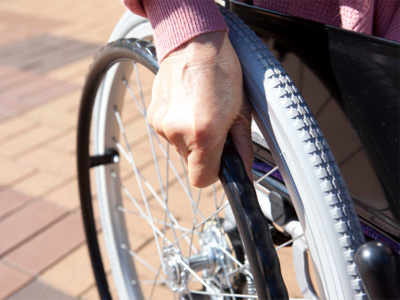- News
- lifestyle
- relationships
- soul-curry
- How an accident changed her life forever
Trending
This story is from October 12, 2015
How an accident changed her life forever
Anybody else in her place may have given up long back, but for Dr Komal Kamra that wasn’t ever an option

Anybody else in her place may have given up long back, but for Dr Komal Kamra that wasn’t ever an option
Who knows what tomorrow will bring when we have no idea what the next moment has in store for us? Here we were, 14 of us family members, on a frosty November morning in 1993, thoroughly enjoying our drive up the mountains on our way to Vaishno Devi.
The next instant all our songs died.The vehicle in which we were travelling plunged into a deep ravine. The accident claimed the lives of my sisters and brothers-in-law.
My two young children, then 12 and 9, had suffered various fractures and deep injuries. At the base hospital, I was told I’d never be able to walk again. With spinal injury at levels D6, D7 and D8, I would be a paraplegic and a wheelchair user for life. For those who would not know about paraplegia (I did not either), I am left with no sensory or motor functions in the lower two-thirds of my body. My mother too had similar injuries.
I realized the wealth I had — friends and more friends. To name the biggest strength, my husband, who took on the task of bringing up a 39-year-old baby, who had no control over her bladder and bowel, to retrain the big baby back to living the way she always wanted to.
My husband and I made a pact that one day we’d cry for all those who had left us, but right now no tears would flow. We had to get on with the business of living and resurrecting broken lives.
But God has his ways. Our pact came unstuck. In April 1997, I lost my husband, my life support, in yet another accident.
This one broke my back. I could have easily slipped into a morass of despair and depression. But once again I chose not to give in. The two of us had celebrated every little success of mine after the accident. The first time I sat up for 15 minutes, the first time I went out in the car, my maiden trip to the university on the wheelchair. Every milestone was cheered and celebrated. He had always egged me on, encouraged me to look ahead and not back. If I was going to the university, taking lectures, attending laboratory work, it was because he believed that I should wring the most out of what I had.
There was no way I was letting him down. I had to live for him, for my still young kids, and for myself. No time to waste, back to college, back to my lab, back to house-keeping, back to kids’ upbringing, back to friends!
I guess I am a born optimist. Nothing can keep me too low for too long. I am happy for what I have today. Tomorrow is really another day. I have a nursing attendant today, who knows if she’ll report for duty tomorrow? On balance, I realize God has given me a lot, even though He has taken away much. I must be the chosen one. God knew I could deal with it. I really see no reason to curse Fate or wallow in self-pity. How are my sorrows any more or less than the next person’s? A burn is a burn, whether first-degree or third-degree.
Many people ask me how I have coped with these tragedies. There is no one answer to that. I have this ability to distance myself from the situation rather effortlessly. When my husband died, I kept telling myself this was not happening to me. This is not something I do consciously. Neither is it a form of escape; it’s an in-built coping mechanism that somehow kicks in.
It also helps that I cram my waking hours with as much activity as my wheelchair-bound existence allows me to.
Many people in my condition might consider themselves as hopeless bed-ridden cripples. They may rail and rant at the insensitivity of public officials and inaccessibility of public utilities and places. I have come to the conclusion that we have to take a more proactive stance. The computer class I used to attend had no ramp, but once they realized I was determined to attend classes, ramp or no ramp, they decided to do something about it.
For the last two years, I got another opportunity from the Indian Spinal Injuries Centre (ISIC), to be a peer counsellor for patients who come with fresh injuries and are at a loss to deal with life.
I come across many male patients whose wives selflessly devote their lives to looking after them and taking care of their smallest needs. But when it comes to women who have incapacitating spinal injuries, many husbands either desert them, neglect them, or dump them at their parents’ place. I had a remarkable husband, and if you see me as this positive, cheerful woman, there’s much I owe that man.
(Published in Soul Curry: Inspirational Stories To Touch And Heal Your Heart, 2010)
Who knows what tomorrow will bring when we have no idea what the next moment has in store for us? Here we were, 14 of us family members, on a frosty November morning in 1993, thoroughly enjoying our drive up the mountains on our way to Vaishno Devi.
The next instant all our songs died.The vehicle in which we were travelling plunged into a deep ravine. The accident claimed the lives of my sisters and brothers-in-law.
My two young children, then 12 and 9, had suffered various fractures and deep injuries. At the base hospital, I was told I’d never be able to walk again. With spinal injury at levels D6, D7 and D8, I would be a paraplegic and a wheelchair user for life. For those who would not know about paraplegia (I did not either), I am left with no sensory or motor functions in the lower two-thirds of my body. My mother too had similar injuries.
There was no time to grieve. Loved ones had died. But this was not an occasion to lament their passing away. We had to pick ourselves up for those who were left behind. My sisters’ children were rendered orphans and I had to rebuild their young lives. Succumbing to grief and despair was the last thing I could afford to do in such trying circumstances.
I realized the wealth I had — friends and more friends. To name the biggest strength, my husband, who took on the task of bringing up a 39-year-old baby, who had no control over her bladder and bowel, to retrain the big baby back to living the way she always wanted to.
My husband and I made a pact that one day we’d cry for all those who had left us, but right now no tears would flow. We had to get on with the business of living and resurrecting broken lives.
But God has his ways. Our pact came unstuck. In April 1997, I lost my husband, my life support, in yet another accident.
This one broke my back. I could have easily slipped into a morass of despair and depression. But once again I chose not to give in. The two of us had celebrated every little success of mine after the accident. The first time I sat up for 15 minutes, the first time I went out in the car, my maiden trip to the university on the wheelchair. Every milestone was cheered and celebrated. He had always egged me on, encouraged me to look ahead and not back. If I was going to the university, taking lectures, attending laboratory work, it was because he believed that I should wring the most out of what I had.
There was no way I was letting him down. I had to live for him, for my still young kids, and for myself. No time to waste, back to college, back to my lab, back to house-keeping, back to kids’ upbringing, back to friends!
I guess I am a born optimist. Nothing can keep me too low for too long. I am happy for what I have today. Tomorrow is really another day. I have a nursing attendant today, who knows if she’ll report for duty tomorrow? On balance, I realize God has given me a lot, even though He has taken away much. I must be the chosen one. God knew I could deal with it. I really see no reason to curse Fate or wallow in self-pity. How are my sorrows any more or less than the next person’s? A burn is a burn, whether first-degree or third-degree.
Many people ask me how I have coped with these tragedies. There is no one answer to that. I have this ability to distance myself from the situation rather effortlessly. When my husband died, I kept telling myself this was not happening to me. This is not something I do consciously. Neither is it a form of escape; it’s an in-built coping mechanism that somehow kicks in.
It also helps that I cram my waking hours with as much activity as my wheelchair-bound existence allows me to.
Many people in my condition might consider themselves as hopeless bed-ridden cripples. They may rail and rant at the insensitivity of public officials and inaccessibility of public utilities and places. I have come to the conclusion that we have to take a more proactive stance. The computer class I used to attend had no ramp, but once they realized I was determined to attend classes, ramp or no ramp, they decided to do something about it.
For the last two years, I got another opportunity from the Indian Spinal Injuries Centre (ISIC), to be a peer counsellor for patients who come with fresh injuries and are at a loss to deal with life.
I come across many male patients whose wives selflessly devote their lives to looking after them and taking care of their smallest needs. But when it comes to women who have incapacitating spinal injuries, many husbands either desert them, neglect them, or dump them at their parents’ place. I had a remarkable husband, and if you see me as this positive, cheerful woman, there’s much I owe that man.
(Published in Soul Curry: Inspirational Stories To Touch And Heal Your Heart, 2010)
End of Article
FOLLOW US ON SOCIAL MEDIA
Visual Stories
Soul Curry invites you to share your real life soul-stirring experiences. If you have any such story to share, do send it to us at soulcurry@timesinternet.in and we will publish it for you!









